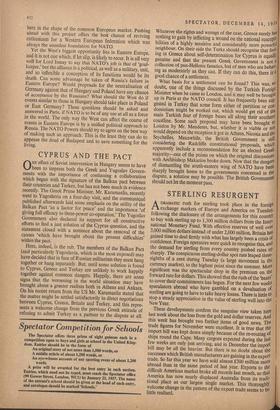STERLING RESURGENT
A DRAMATIC rush for sterling took place in the foreign CV exchange markets of Europe and America on TuesdaY, following the disclosure of the arrangements for this country to buy with sterling up to 1,300 million dollars from the Inter' national Monetary Fund. With effective reserves of well over 3,000 million dollars instead of under 2,000 million, Britain has gained time to deal firmly with what has largely been a crisis of confidence. Foreign operators were quick to recognise this, and the demand for sterling from every country pushed rates uP sharply. The conspicuous sterling-dollar spot rate leaped three' eighths of a cent during Tuesday (a large movement in the currency market), to the highest point since the summer. More significant was the spectacular drop in the premium on the forward rate for dollars. This showed that the rush of the 'bears, to cover their commitments has begun. For the next few weeks speculators abroad who have gambled on a devaluation of sterling are going to have to take heavy losses. There is little to stop a steady appreciation in the value of sterling well into the New Year.
These developments confirm the sanguine view taken here last week about the loss from the gold and dollar reserves. And this week has brought two further items of good news. The trade figures for November were excellent. It is true that the import bill was kept down simply because of the re-routing of ships round the Cape. Many cargoes expected during the last few weeks are only just arriving, and in December the import bill may be all the heavier. But there is no doubt about the successes which British manufacturers are gaining in the export trade. So far this year we have sold almost £300 million more abroad than in the same period of last year. Exports to the difficult American market broke all records last month, so that America has now nearly displaced Australia from its tradi. tional place as our largest single market. This thoroughly welcome change in the pattern of the export trade seems to be little realised. The second piece of good news comes from the International Monetary Fund itself—for the last few years an unlikely source 01 encouragement. But the new director, Dr. Per Jacobsson, in a statement accompanying the announcement of the drawing, Pointed out that Britain's trading position has been and con- tinues to be essentially sound, and gave a timely reminder of the service which sterling provides for the world as an inter- national currency. This sympathetic appreciation of the unique Position of sterling from the head of the IMF is a new and most hopeful sign for the future.











































 Previous page
Previous page